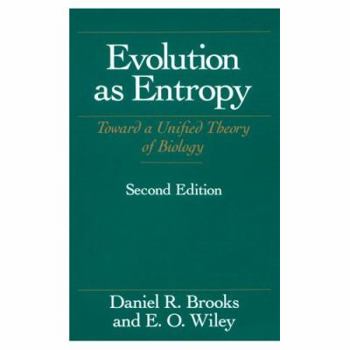Evolution As Entropy
Select Format
Select Condition 
Book Overview
"By combining recent advances in the physical sciences with some of the novel ideas, techniques, and data of modern biology, this book attempts to achieve a new and different kind of evolutionary synthesis. I found it to be challenging, fascinating, infuriating, and provocative, but certainly not dull."-James H, Brown, University of New Mexico "This book is unquestionably mandatory reading not only for every living biologist but for generations...
Format:Paperback
Language:English
ISBN:0226075745
ISBN13:9780226075747
Release Date:October 1988
Publisher:University of Chicago Press
Length:429 Pages
Weight:1.30 lbs.
Dimensions:0.9" x 6.0" x 9.0"
Customer Reviews
2 ratings
Seminal and thought provoking; I highly value this book
Published by Thriftbooks.com User , 15 years ago
This is a very technical book, but it was well worth the effort for me. I first read it 8 years ago, and I still re-read it about once a year to ponder the implications. It is a refreshing, challenging, and potentially revolutionary view of evolution. While it may not prove to be the final understanding of this topic, it is a solid attempt to provide a thermodynamic underpinning for the law of Evolution. It contains 2 profound and provocative hypotheses: 1) Information stored in living creatures' DNA can be modeled as a hierarchy of information stored at the different structural scales of the genome. This is based on the work of Prigogine to unify classic energetic entropy with informational entropy. (they call this Hierarchical Information Theory) 2) assuming that 1 is true, if you calculate the entropy stored in the hierarchy across a given population of a specie, the entropy will rise at the rate predicted by standard formulations of the 2nd law of thermodynamics rate as the population reproduces and evolves. I found the critique in the 1-star review to be far off the mark. Apart from the ad hominem critique of the authors as non-biologists, the 2nd law of thermodynamics does not include a 'quality of energy' or 'quality of information' measure, as (apparently) asserted in the cited critique. While many people (and scientists) incorrectly view the law as implying that the quality of energy diminishes over time, a more correct view states that energy (or information) will become less _available_ over time, with fewer and fewer states accessible. This is precisely the point of the theory propounded in this book - to describe evolution without recourse to non-physical quantities such as information 'quality'.
Entropy controls all physical processes, including biology
Published by Thriftbooks.com User , 19 years ago
The laws of thermodynamics dictate that the trend of the universe is towards an increasing state of disorder (entropy increasing). However, that only applies to the entire universe, it is not a violation of the laws to have local increases in order. Therefore, the order that defines living creatures is not a violation of the laws of physics; the increasing entropy of the sun more than balances the decrease in entropy represented by life. The authors argue that the variety created by the process of evolution is an inevitable consequence of the increase in entropy. There is some obvious justification to their point. New species evolve via changes in genetic structure, some of which is due to recombination and other changes are caused by random alterations in the DNA, which leads to mutation. Since the genetic material that contains the blueprint for a living creature is a compact, highly ordered collection of information, random changes would be an increase in entropy. There is also a great deal of evidence indicating that aging is at least partially due to an accumulation of errors in the DNA, which can be interpreted as an increase in entropy. Since aging and death are necessary preconditions for evolution to take place, the argument that entropy is a driving force for evolution is a sound one. However, that means less than it may appear at first thought. Since an increase in entropy is such a powerful force in the universe, it is a part of every physical process. A great deal of ink is also spent in describing the role of information in evolution. The authors are also on a sound footing in this area. When a species goes extinct, at least some of the information coded in their genetic complement is lost. This can also be interpreted as going from an ordered to an unordered state, which is an increase in entropy. While I don't agree with all the arguments put forward in this book, the authors make many very fundamental points regarding the theory of evolution. As near as we can tell, an increase in the entropy of the universe is inevitable. One could argue that by definition, God is a violation of the second law of thermodynamics. Therefore, any theory of physical processes over time must include the role of entropy, which is what the authors do in this book.





